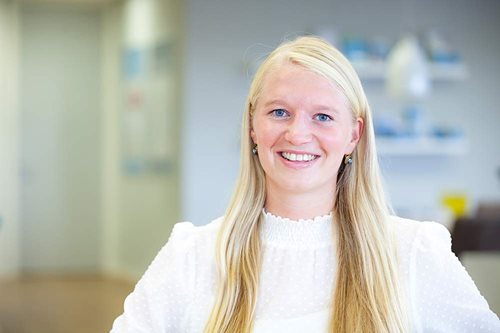
The impact of a cancer diagnosis is enormous, but a diagnosis of rare cancer brings along some additional problems. Lower survival rates, longer diagnostic processes, fewer treatment options, lack of information - just a few of the issues that people with rare cancer may face. Better support for patients, targeted policies on rare cancer issues, and funding for more extensive research are therefore necessary, according to IKNL-researcher Eline de Heus. She conducted research at Radboud university medical center, and on February 29, she defended her dissertation titled 'Rare versus common cancers in the Netherlands'.
In her dissertation, De Heus combines epidemiological research with data from the Dutch Cancer Registry, along with research on the psychosocial impact of rare cancer and healthcare organization. This provides a particularly comprehensive picture of the problems with rare cancer and the necessary solutions.
This is urgently needed. Compared to patients with common cancers, the improvement in survival rates for patients with rare cancer significantly lags behind. They are more likely to experience misdiagnosis and have a lower quality of life due to factors such as uncertainty and the feeling of needing to take control themselves. Better organization of healthcare, timely utilization of expertise centers, and quicker referrals contribute to more equitable care. All of this requires adequate funding, more extensive research, and good coordination with the healthcare sector.
More funding and targeted policies
That's why rare cancers are also one of the prioritized goals of the Dutch Cancer Agenda, launched by the Dutch Cancer Collective in November 2023. The Agenda emphasizes that policymakers must prioritize rare cancers so that patients with these diagnoses also have equal access to care, including through research and funding. Dutch Cancer Society KWF recently funded several studies on rare cancers. It's a good start, but more is needed. And there lies an important role for politics, according to De Heus: 'The Ministry of Health must prioritize rare cancers in their policy efforts and allocate targeted subsidies for improving diagnosis and treatment.'
Concrete recommendations
-
Funding for epidemiological and psychosocial research on rare cancers
-
Policies aimed at improving the (organization of) care for rare cancers
-
(Psychosocial) support for patients and their families in navigating the healthcare system, for example, through a designated (nursing) contact person
-
Increasing and disseminating knowledge about rare cancers among healthcare providers
Well-organized expert care is essential
Expert care is of great importance in the care of people with rare cancers, emphasizes Carla van Herpen, professor of Rare Cancers at Radboud university medical center: 'The care for people with rare cancer will significantly improve if every patient reaches an expert.' However, this expert care is not yet consistently or clearly accessible, as made clear by IKNL in the Dutch report 'Rare cancer: Organization of expertise' (2023).
De Heus's research also showed that finding the right care is still a challenge for patients. De Heus states: 'People with rare cancer often feel compelled to become experts themselves due to a lack of information and support.' Several key stakeholders, such as the Dutch Federation of University Medical Centers, the Ministry of Health, Welfare and Sport, the Association of Collaborating Parent and Patient Organizations, and the Dutch Federation of Cancer Patient Organizations, recognize the urgency to better organize oncology expert centers and are in discussion about this.
More information about this dissertation
Defense on February 29 at 12:30 p.m. by Eline de Heus. Dissertation title: Rare versus common cancers in the Netherlands (available online after February 29). (Co-)supervisors: Prof. Dr. M.A.W. Merkx, Prof. Dr. C.M.L. van Herpen, Dr. S.F.A. Duijts, Dr. J.M. van der Zwan.

-
Want to know more about these subjects? Click on the buttons below for more news.
More information
Pauline Dekhuijzen

wetenschaps- en persvoorlichter





